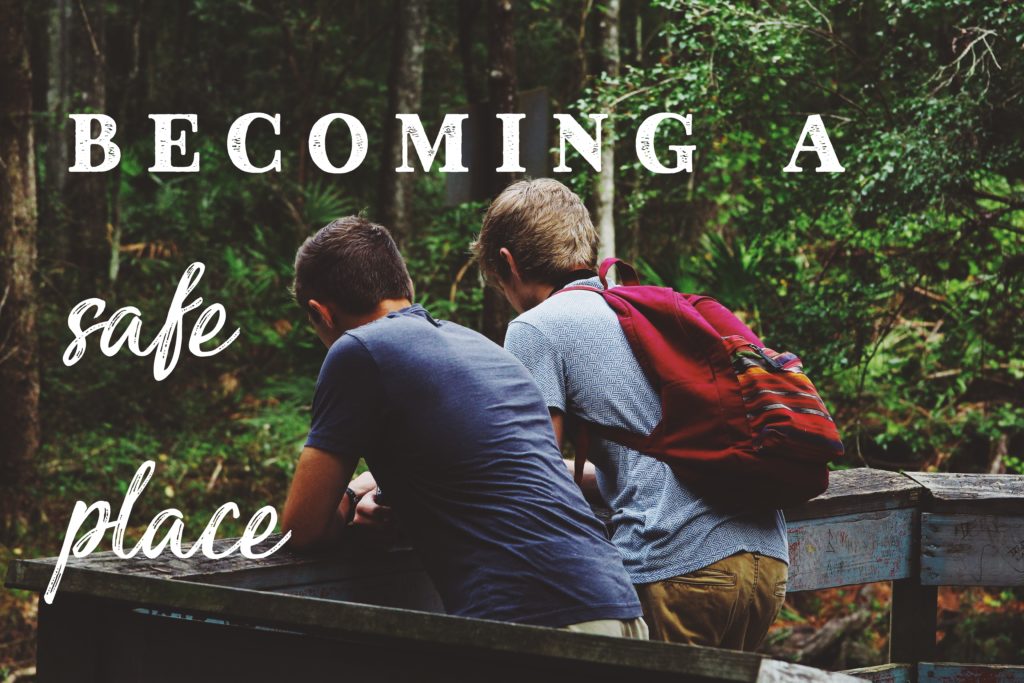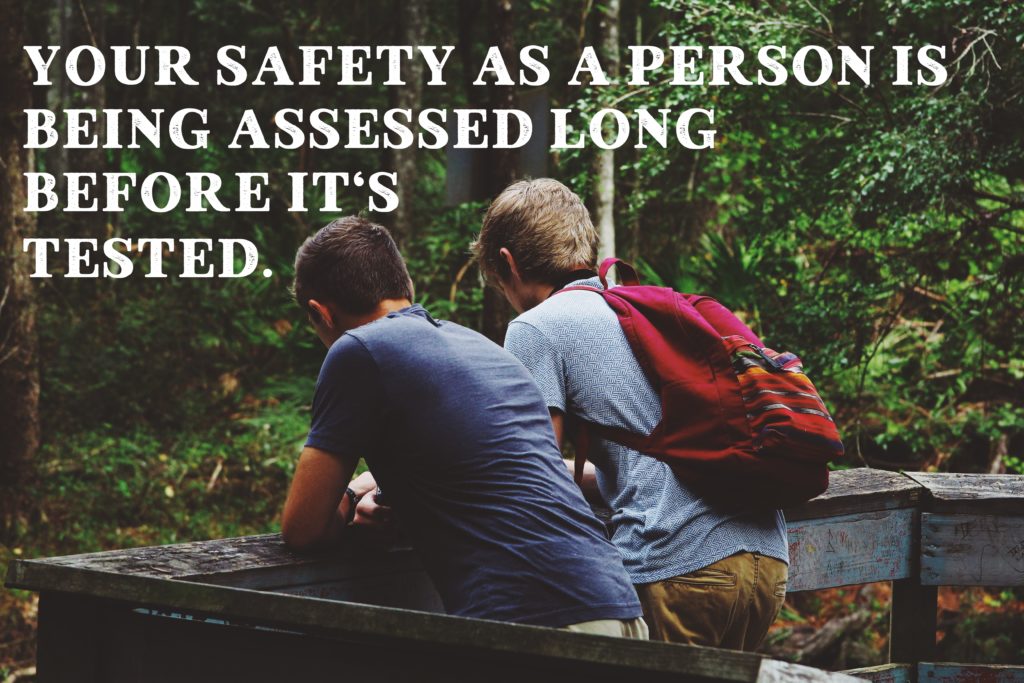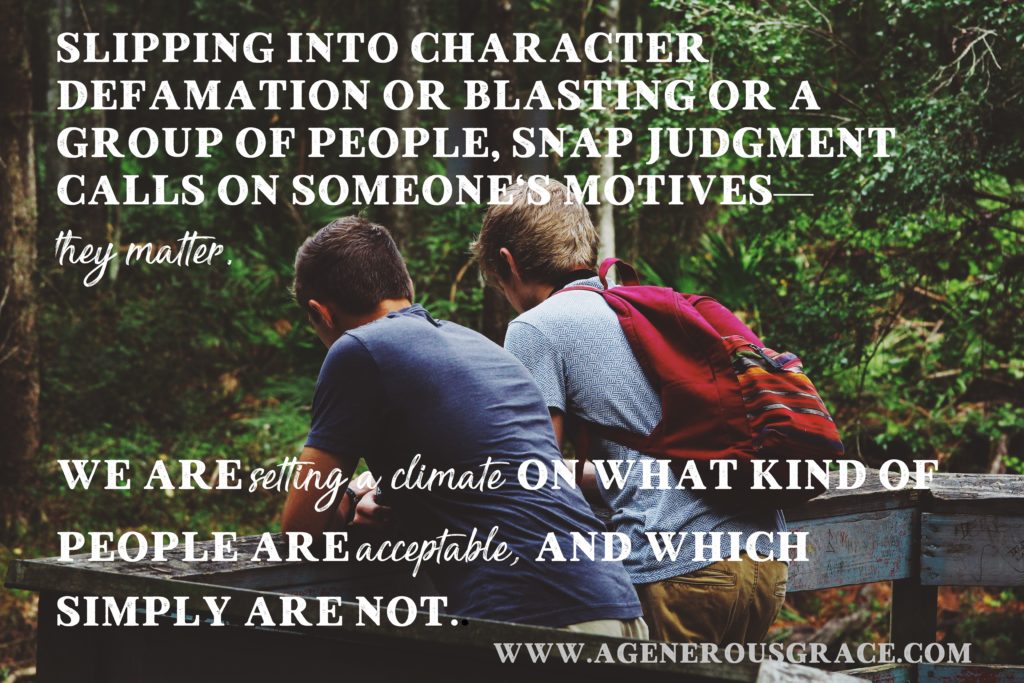 It was after lunch. We stood on the curb before we walked out to our respective cars. She’d divulged some hard stuff, stuff that could easily be embarrassing outside of the little table we’d shared inside. I was about to step off the sidewalk—and then I thought what it might feel like to be her.
It was after lunch. We stood on the curb before we walked out to our respective cars. She’d divulged some hard stuff, stuff that could easily be embarrassing outside of the little table we’d shared inside. I was about to step off the sidewalk—and then I thought what it might feel like to be her.
I think I said something really astounding, like, Hey. Thanks. For just, y’know, sharing hard stuff. That is always a gift to me. (My husband taught me that part. He says it’s always a holy gift when someone shares their heart with you.) I know you could be tempted to feel kind of naked after all this. But thanks for just trusting me to keep stuff like that safe. I’m going to be praying with you.
She looked me in the eye and said, “I hope I’m that place for you when you need it.”
Authentically Isolated
Most of us understand how Christians can be an intimidating bunch. …Even for us Christians.
As easily as “authentic” and “real” roll off the tongue, it’s a whole ‘nother ball o’ wax to engage on that level. Brené Brown writes wisely,
The difficult thing is that vulnerability is the first thing I look for in you and the last thing I’m willing to show you. In you, it’s courage and daring. In me, it’s weakness.
Trust me. As a blogger on some hard emotional stuff, it’s still easy to slather on a layer of language that sounds more revealing–while my heart remains submerged in insecurity, pride, pain, or layers of self-protective callus.
Honest relationships relay nothing short of what God says to us: Come exactly as you are. I’ll give you rest where you’re limping and exhausted. You will be enveloped—beckoned, even—by kindness you don’t have to deserve. All you’re carrying, no matter what it looks like or where it’s been drug through — or where it’s at this very second — can be exchanged for beauty. We’re all equal in our need for Jesus.
So how can we be the kind of people who are safe to come to?
I’m thinking we all have space to grow in order to be safer. (I’m positive I do.)
And that’s the heart behind this new series that will be popping up here: How to better be a person of refuge, who’s emotionally safe.
Truth #1: Your safety as a person is being assessed long before it’s tested.

People who are bruised can have a hyper-sixth-sense. They may be super-tuned to our responses on how others totally bite it.
Say there’s a guy with homosexual urges. He overhears a friend scoffing about another guy struggling with porn. Or maybe he hears his friend doling out an outspoken opinion on a less-sensitive gray area, like alcohol. If I were in his Nikes, I’m thinking, If he’s convinced my margarita is a sin, I can imagine what he’d say to urges of a more questionable caliber.
How do we react, even in close circles, to those who offend us? Who disagree with us?
Clearly God’s opposed to diluting truth. Jesus didn’t mince words about the Pharisees, a.k.a. brood of vipers, to make other people feel safe…but the people he came down hard on were the self-righteous. And our own authenticity frequently sets the tone for others to be themselves. But Ephesians 4:29 applies to venting, too: Let no corrupting talk come out of your mouths, but only such as is good for building up, as fits the occasion, that it may give grace to those who hear (emphasis added). (You might find helpful these ideas on the tension of “being ourselves.”)
 Slipping into character defamation or blasting or a group of people, snap judgment calls on someone’s motives—they matter. We’re setting a climate on what kind of people are acceptable, and which simply aren’t.
Slipping into character defamation or blasting or a group of people, snap judgment calls on someone’s motives—they matter. We’re setting a climate on what kind of people are acceptable, and which simply aren’t.
The Shame Factor
Remember, shame makes people want to head for cover. Jesus shouldered all our shame, so now we’re free of it; accepted wholly. Embraced. In a few words, that’s what a person of refuge is in my mind: A shame-lifter. (See the important distinction between guilt and shame here.)
Of course it’s okay to talk about what we disagree with, or what’s wrong. But are people still picking up the vibe, There, but by the grace of God, go I? Our flippant creation of us/them categories can have long-reaching tentacles. Words have muscle.
Our humility is directly proportional to our level of relational safety.
A fear of misinterpretation can’t keep us from pursuing interactions about our real responses to life. But failure to speak truth in love when we’re seeking that reassuring agreement from like minds? It can reveal what we really think about the kindness others deserve.
This week, may you be both the recipient and the giver of a safe space.
The Safe Place Series, #2: On Giving Pat Answers the Boot
The Safe Place Series, #3: Practical Tips to Becoming a Person of Refuge
Like this post? You might like
- “Am I Judgmental?” Judgment vs. Discernment
- 6 Ways to Take Your Relationships Deeper, Parts 1 and 2
- Questions to Take Your Relationships Deeper, Set #1, #2, #3, #4, #5, and #6
- The Flipside of “Being Myself”
- Shame on You? Shame-Parenting vs. Guilt Exposure
- Shame and Your Marriage: On What Keeps Us Hiding (And Clawing Your Way Out)







